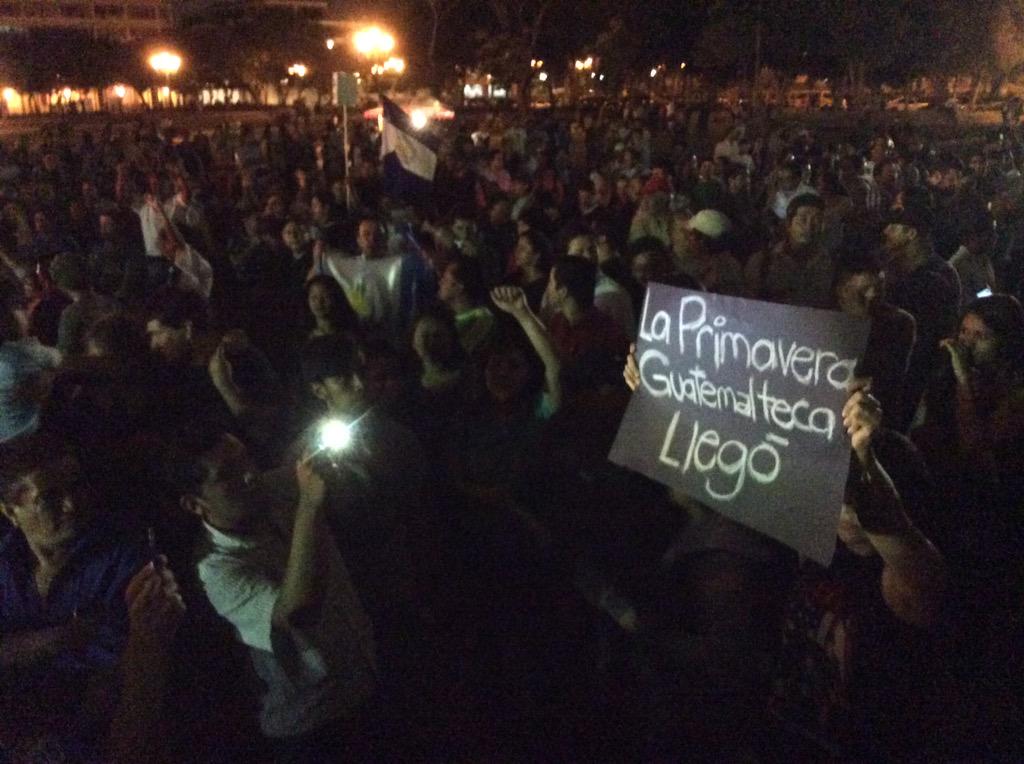 |
| Photo: @PrensaComunitar |
Francisco Goldman, in his masterful book The Art of Political Murder, shows how political power in Guatemala acts with such impunity as to border the magical realism of Latin American fiction. (Goldman examines the 1998 murder of Bishop Juan Gerardi, just days after the commission he led released a scathing report on military culpability in Guatemala's civil war atrocities.)
Even more bizarre was the 2009 murder of lawyer Rodrigo Rosenberg (see David Grann's brilliant dissection of the case in the New Yorker). Days before his assassination, Rosenberg had recorded a video predicting his death and accusing the then-President and First Lady of orchestrating it. Protestors were on the streets then, too, although in fewer numbers. And, in the end, it turned out that Rosenberg had commissioned his own assassination (in order to shine a light on the corruption coming from the President's office and family).
Everyone agrees that corruption is a major problem. Indeed, the country considered itself so corrupt that it agreed to charter the International Commission Against Impunity in Guatemala (CICIG) in 2007. CICIG, with UN backing, is a body of international jurists authorized to conduct investigations and build cases for charges filed in Guatemalan courts.
CICIG's explicit goal is to dismantle the parallel power structures of organized crime, narco-traffickers, and former military fraternities. CICIG has been instrumental in the arrests of a former president (money laundering), two national police chiefs (corruption), the head of the anti-narcotics agency (drug trafficking), and number of other well-placed officials.
CICIG's explicit goal is to dismantle the parallel power structures of organized crime, narco-traffickers, and former military fraternities. CICIG has been instrumental in the arrests of a former president (money laundering), two national police chiefs (corruption), the head of the anti-narcotics agency (drug trafficking), and number of other well-placed officials.
Its latest investigation resulted in the current (2015) protests.
The scandal, known as "La Linea" (see Guatemalan Chimney's excellent overview here) emerged when CICIG announced 47 arrest orders for a massive tax evasion scheme, including superintendent of SAT (equivalent of our IRS commissioner) and the Vice-president’s personal secretary (named as the ring leader of the organization). The group has a special phone number (la linea) to avoid duties and a shell corporation to accept the estimated $130 million in payments for services.
The scandal, known as "La Linea" (see Guatemalan Chimney's excellent overview here) emerged when CICIG announced 47 arrest orders for a massive tax evasion scheme, including superintendent of SAT (equivalent of our IRS commissioner) and the Vice-president’s personal secretary (named as the ring leader of the organization). The group has a special phone number (la linea) to avoid duties and a shell corporation to accept the estimated $130 million in payments for services.
The Vice-president (Roxana Baldetti) and her secretary (Juan
Carlos Monzón) were in South Korea at the time of the arrests, and Monzón refused to return to Guatemala. Wire tap transcripts make numerous references to an unnamed co-conspirator,
referred to as “La Número 2,” “La Senora” or “La ‘R’,” widely believed to be Baldetti.
On April 25th massive protests filled the Central Plaza and downtown of Guatemala City, and have continued weekly. Organized through social media, these seem to be largely acephalous and non-violent. See my thoughts in Jared Goyette's great PRI piece (http://www.pri.org/stories/2015-05-02/guatemalan-spring-youth-driven-protests-demand-president-s-resignation).
On May 8th, to the surprise of many jaded observers, including your correspondent, the normal wall of impunity crumbled, and Baldetti was forced to resign. Presidential elections are later this year; if a clean candidate could capture the energy of these protests, this could be a watershed moment for Guatemala. A new Spring.




No comments:
Post a Comment